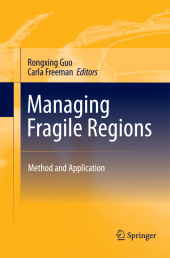 Neuerscheinungen 2014Stand: 2020-02-01 |
Schnellsuche
ISBN/Stichwort/Autor
|
Herderstraße 10
10625 Berlin
Tel.: 030 315 714 16
Fax 030 315 714 14
info@buchspektrum.de |

Carla Freeman, Rongxing Guo
(Beteiligte)
Managing Fragile Regions
Method and Application
Herausgegeben von Guo, Rongxing; Freeman, Carla
2011. 2014. xv, 174 S. 18 Tabellen. 235 mm
Verlag/Jahr: SPRINGER, BERLIN; SPRINGER NEW YORK; SPRINGER 2014
ISBN: 1-489-98725-8 (1489987258)
Neue ISBN: 978-1-489-98725-9 (9781489987259)
Preis und Lieferzeit: Bitte klicken
This book brings together leading scholars from several disciplines to address post-disaster reconstruction, management of natural resources, and regional development in earthquake-hit areas using the lessons from the Wenchuan earthquake of May 2008.
This book gathers the work of leading scholars from several disciplines on fragile regions, especially those regions seeking to preserve, strengthen or create processes to restore or reestablish security and effective social and economic management. It tackles the multifarious issues that shape and affect fragile regions, drawing upon a wide range of intellectual and methodological approaches, including such fields as area studies, natural resource science, biology, environmental and resource economics and management, and political economy. The volume brings together the perspectives of a diverse group of contributors from Australia, China, Hong Kong, Indonesia, Japan, South Korea, and the United States. Managing Fragile Regions: Method and Application addresses a variety of factors - natural, political, administrative, legislative, economic, social, and cultural - and examines how they exert influences on the operational mechanisms of fragile regions, especially in the contexts of peace and security, economic development, and environmental management. The volume´s nine chapters cover a wide range of examples of fragile regions and their challenges. It will be of interest and utility to practitioners and policy-makers engaged in disaster management and post-disaster reconstruction. Students, researchers, and other professionals involved in resource management, regional science, and environmental science will also find it valuable reading.
Studying Fragile Regions: An Interdisciplinary Overview.- Fragile Edges between Security and Insecurity: China´s Border Regions.- DMZ and Destiny of the Divided Korea Peninsula.- Territorial Fragility and the Future of Tibet: Sub-sovereignty, Problems and Solutions.- Boundaries, Territorial Disputes and Water Insecurity: Evidence from the Lower Mekong Basin.- Understanding the Determinants of Livelihood Recovery after a Large Earthquake.- The Characteristics of Earthquake-induced Geo-hazards in Mountain Areas.- NGOs and their Roles in Post-Earthquake Reconstruction


